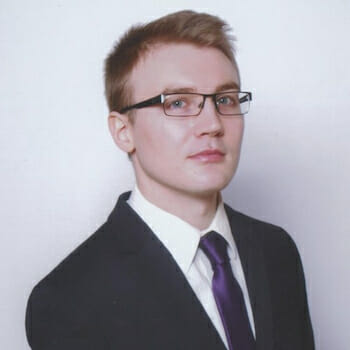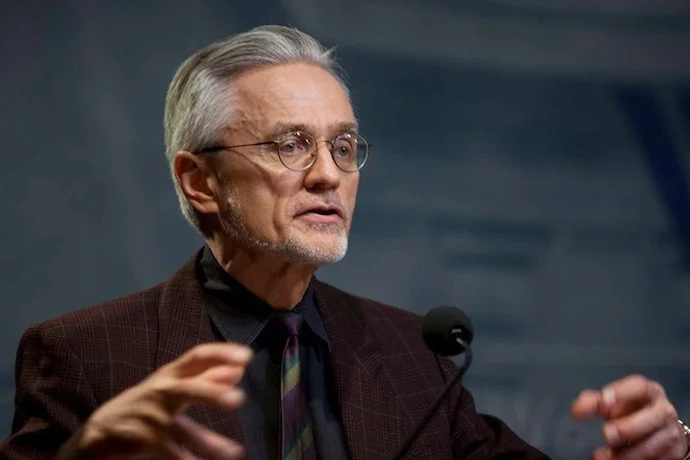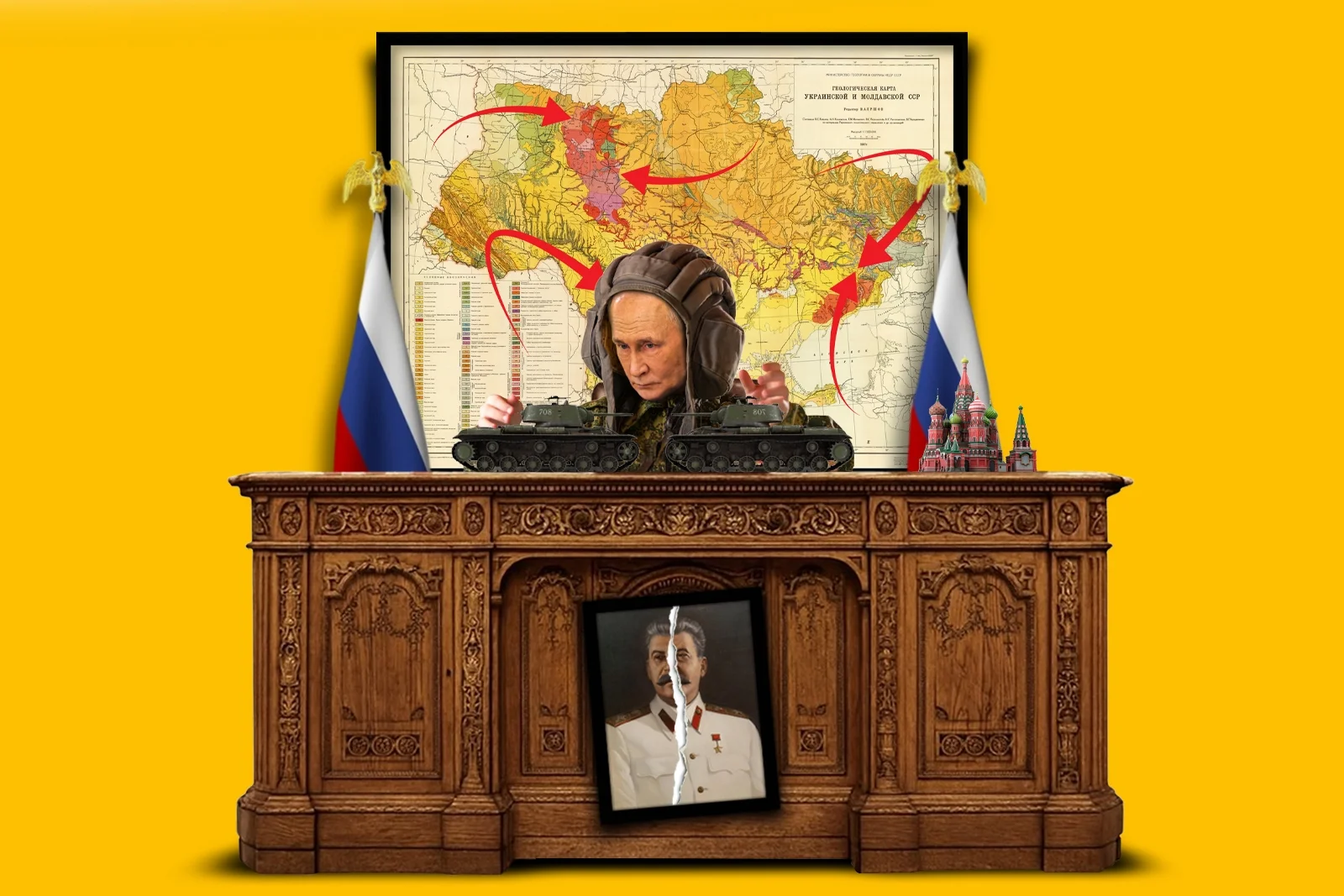
When Empires Refuse to Die: Motyl on Putin’s War and Its Consequences
Alexander J. Motyl is a political scientist, historian, novelist, and professor of political science at Rutgers University–Newark. A leading specialist on Ukraine, Russia, the USSR, nationalism, revolutions, and empires, he has long been recognized for his unflinching analysis of power, ideology, and collapse in post-Soviet space.
Motyl previously served as associate director of Columbia University’s Harriman Institute, one of the foremost centers for the study of Russia and Eastern Europe. His scholarship includes Imperial Ends: The Decay, Collapse, and Revival of Empires—a landmark examination of how empires dissolve and reinvent themselves—and the co-edited volume The Holodomor Reader: A Sourcebook on the Famine of 1932–1933 in Ukraine, a defining contribution to understanding Soviet atrocity and Ukrainian national trauma. Beyond academia, he writes frequent analyses of the Russian–Ukrainian war for 19FortyFive, The Hill, and the National Security Journal, and has been featured in Columbia SIPA’s Journal of International Affairs. His recent essays explore themes of Western policy, Russian regime stability, and the long arc of decolonization across Eurasia.
In this interview, Motyl argues that the Kremlin’s war aims are fundamentally neo-imperial—not limited to territorial expansion but directed toward the erasure of Ukrainian statehood and identity itself. He situates Vladimir Putin within a centuries-long lineage of Russian imperial ideology, tracing continuities that stretch from the czarist era through Soviet dominance to the present authoritarian revival. Contrary to Kremlin narratives, Motyl dismisses NATO enlargement as a genuine catalyst for invasion, noting that Ukraine’s membership prospects were effectively nonexistent.
Instead, he portrays today’s Russia as a brittle, hyper-centralized regime marked by paralysis and overreach—a system in which misjudgment and misinformation are endemic. The elite’s passivity during the Prigozhin mutiny, he suggests, exposed the fragility of Putin’s power and the hollow performance of loyalty sustaining it. Motyl envisions plausible scenarios of post-Putin fragmentation, beginning not in Moscow but along the empire’s restive peripheries. He also dissects the parallel information war: expert analysis battling viral disinformation, think tanks competing with Telegram channels. Yet he ends with cautious optimism. The war, for all its devastation, has forced a global reckoning with Ukraine’s history, resilience, and agency—an awakening long overdue in Western political imagination.
Scott Douglas Jacobsen: This is a concern shared widely, from scholars in both East and West to ordinary Ukrainians living through the war. Why do you argue that Putin’s central objective is not merely the conquest of territory, or even of all Ukraine, but the erasure of Ukrainian statehood itself?
Alexander Motyl: It’s a question of the ideology that motivates him. It’s a Russian imperial ideology that goes back several hundred years—at least to the time of Peter the Great, arguably earlier—when Muscovy began its project of gathering territories it considered its own.
This ideology has existed for three or four centuries. It was at the core of the Russian imperial project before 1918 and the collapse of the empire. It was also central to the Soviet project. They didn’t call it Russian, but it was clearly a Russian-oriented or Russian-based state policy.
It has now become the core of Putin’s project. Even under Yeltsin in the 1990s, the rhetoric was imperial. The policies were half imperial and half democratic, and there was at least some hope that Russia might abandon its imperial pretensions. It might have—but Putin became prime minister in 1999, acting president at the end of that year, and president in 2000. Very quickly, he embraced this ideology, consistent with his background as a KGB officer, and it has driven his policies toward the former Soviet republics since he took office.
According to this ideology, Ukrainians, like Belarusians, do not really exist. They are, quite literally, seen as a plot by Western imperialist secret services.
They are portrayed as creations of the Germans, of the Austro-Hungarians, of the West in general. In other words, the notion that Ukraine deserves to be a separate state with its own national identity has been, in this view, foisted upon the so-called “Little Russians,” as Putin prefers to call them, by deranged nationalists under the influence of Western intelligence agencies.
From that point of view, the purpose of the war is to erase whatever claims Ukrainians might have to being Ukrainians, and to transform them into a passive “Little Russian” population that accepts subordination to the “Great Russian people.” Hence, the project is one of erasure.
That doesn’t necessarily mean Putin wants to kill everyone. However, many of his subordinates and propagandists have made that option explicit. They have openly said, “If we can’t convert you to Russianism or Little Russianism, we will kill you.” The former president of Russia, Dmitry Medvedev, has made this claim repeatedly in his public statements. So, that is at least an option on the table.
Preferably, from their perspective, it means getting rid of the so-called nationalists. And ironically, the Jewish Ukrainian president, Volodymyr Zelensky, is one of the foremost Ukrainian nationalists in their eyes. The goal is to remove people like him and replace them with a pliant regime, a compliant elite, and a submissive population—much like what the Russians hoped to achieve with Viktor Yanukovych, and what they have, in many ways, already achieved with Alexander Lukashenko and Belarus.
The Belarusians, despite having demonstrated their own sense of national identity in the mass protests a few years ago, have essentially been forced into submission. They caved. The Ukrainians resisted—and we’ll see how that turns out.
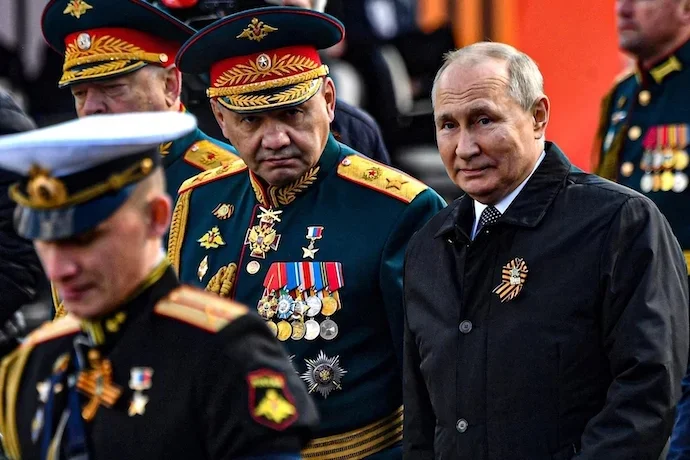
Jacobsen: What do Western analysts or commentators typically misread about Russian aggression against Ukraine?
Motyl: For starters, the belief that it has something to do with NATO enlargement is one of the most important misreadings. It was clear from the very beginning, certainly by 2021 and 2022, and in fact every year since 1991, when Ukraine became independent, that Ukraine’s chances of becoming a NATO member were essentially zero.
Ukraine’s chances of joining NATO were exactly zero in 2013 and 2014, and they were exactly zero again in 2021 and 2022. The Russians could not have been unaware of that fact, because the Ukrainians knew it, the Europeans knew it, and NATO knew it. Yes, back in 2008, at the Bucharest Summit, NATO did declare that the “future of Ukraine lies with NATO.” Still, that statement, along with a dollar, would get me a ride on the New York City subway.
There were no intentions whatsoever to expand NATO to include Ukraine. In addition, Putin must have known—as his intelligence services certainly did—that the so-called NATO armies were in dreadful shape. They were in no position to launch an attack on Russia.
NATO was a paper tiger. Ukraine’s chances of joining this paper tiger were essentially nil, and Putin had to have known that. So why did NATO membership for Ukraine matter to him? Not because of any genuine security threat—that was all a smokescreen. The real issue is that if Ukraine were to join NATO and later the European Union, it would mean that Ukraine would be lost to Russia forever. That’s why it mattered.
It would signify Ukraine becoming part of what Putin calls “the West,” or whatever remains of it after the Trump era. That is what truly concerned him. It wasn’t about a military threat. He has even admitted as much on multiple occasions—most recently at the Valdai Discussion Club meeting in St. Petersburg—where he said NATO poses no threat to Russia. If he says that today, after more than three years of war, he would have said the same four years ago if pressed.
So that’s mistake number one—the fundamental misreading. It skews everything, because it shifts the blame for the war onto NATO, supposedly the aggressor, and onto Ukraine, as if it harboured evil intentions toward Russia.
In reality, that’s absurd. Back in 2014, Ukraine had only about 7,000 battle-ready troops. By 2022, the situation had improved somewhat, but had it not been for the thousands of volunteers who immediately joined the armed forces after the invasion, Ukraine likely would have fallen. So Ukraine posed no threat—no security threat whatsoever, not even an imaginable one—to the Russian Federation.
The only other plausible explanation for his fear of NATO is that he is deeply paranoid—perhaps even pathologically so. In other words, he appears to have serious psychological problems. He is incapable of accepting that NATO, essentially a paper tiger, truly was a paper tiger.
He cannot imagine that the intelligence his own security services provide might actually be accurate. That’s possible—plausible, even—but in any case, it has nothing to do with the reality of NATO enlargement. It has everything to do with Putin’s personal phobias.
The other major misconception, which still hasn’t been fully corrected, concerns the idea that Putin is somehow a “normal” leader—a man like one of us. There’s plenty of variation within what we call “the West,” and of course, it has its own flaws. Not everyone in the West is rational or devoted to human rights and democratic values. But it should have been evident to anyone with even a minimal understanding of the Soviet Union that a KGB officer was never going to be at the forefront of defending human or national rights.
That should have been self-evident to anyone who knows the history of the KGB and its predecessors in the Soviet system. Putin joined the KGB voluntarily in the early 1970s, at the height of the Soviet crackdown on the dissident movement. He knew exactly what he was doing and why.
To imagine that such a man would have democratic leanings or a Western sense of rationality—concerned with rights, the rule of law, or individual liberty—is absurd. He was not only a KGB operative but also a product of the Russian elite. And as we’ve already discussed, he is steeped in the Russian imperial ideology. It’s hardly surprising, then, that he is someone who believes deeply in power, in force, and in Russia’s need to “be made great again.”
Expecting this kind of individual to behave normally or to share Western values was wishful thinking. Remember when George W. Bush said he looked into Putin’s eyes and “saw his soul”? I wish I had those eyeglasses.
There are many other mistakes Western observers have made. Let me end with a third one. We’ve talked about NATO and Putin, and the third is the persistent belief that Russia is not an empire—or at least not a deeply fractured multinational state.
This misconception was already evident in the 1980s, when most Western governments and analysts were unwilling to acknowledge the importance of the non-Russian peoples within the Soviet Union. I say this as someone who has studied and written a dissertation on the non-Russian nationalities. Back in the early to mid-1980s, people like me were considered strange—eccentric, even—for focusing on them.
It was widely believed that there was no point in studying the non-Russian nationalities because, as one scholar once told me at a conference, “They don’t matter.” As it turned out in 1989, 1990, and 1991, they mattered enormously. Had it not been for them, the Soviet Union might actually have continued to exist.
The inability to recognize that Russia has an imperial structure—or at least to understand that it consists of a variety of deeply dissatisfied nationalities—was a fundamental problem. It made it very difficult for Western analysts to understand what was happening in the 1980s under Gorbachev, and it continues to distort their understanding of Russia’s relationship with its former Soviet republics today.
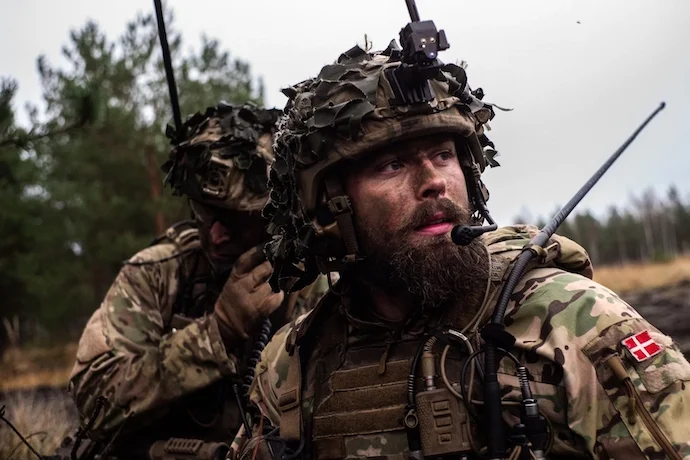
Jacobsen: On that point, how durable is Russia’s domestic “consent” for a long war? What are the potential or plausible triggers for regime fracture or collapse?
Motyl: Analysts in this field, as with nearly every question, are divided into two camps. Some believe that Putin is firmly in charge, that all is well, and that the system will survive even after he’s gone—for any number of reasons.
Then there’s the other group, to which I belong, that believes the system is fragile and brittle. Putin and the regime are in trouble, and scenarios predicting the possible collapse of the Russian Federation are neither unlikely nor impossible. In fact, they are becoming increasingly likely.
I say that for several reasons. The most obvious is the toll of the war. Russia has likely lost over a million soldiers, if we include killed and seriously wounded. Its economy, as nearly everyone now agrees, is in serious trouble.
Optimists say it could sustain the war until 2027. Pessimists suggest a perfect storm could emerge as early as late 2025. In any case, there’s a growing consensus that major trouble lies ahead and that the war will eventually become unsustainable.
The military and the economy are in trouble, and the population is beginning to feel the strain. Inflation is eroding living standards. Those employed in the militarized sector—roughly half the population—are doing relatively better, or at least less badly, than others. But the other half, those in the consumer sector, are facing increasing hardship.
Then there are Russia’s elites—the political, coercive, and economic elites. Most have been co-opted, but all have lost a great deal since the war began.
As we saw during the Prigozhin affair two years ago—the short-lived march on Moscow—the real significance wasn’t Prigozhin himself. The key revelation was that as he gathered his forces and advanced toward the capital, no one within the army, the FSB, or the National Guard acted. They watched to see how it would unfold.
To me, that signaled not loyalty, but a striking lack of enthusiasm—at best, tepid support—for Putin’s regime.
That’s the background. More immediately, Putin has constructed a highly centralized political system. I’ve been calling it fascist since about 2008. Some agree; others object to the label. But whatever we call it—autocracy, dictatorship, authoritarianism—the fact remains that virtually all power is concentrated in Putin’s hands.
That centralization makes governance inefficient. We know from other historical examples that subordinates tend to tell such leaders what they want to hear, not what they need to know. It’s a system built on buck-passing and corruption—deep, pervasive corruption. And because so much depends on a single man’s decisions, the entire structure is brittle.
Given his position and the filtered information he receives, Putin is especially prone to serious errors. Some like to call him a “grand chess master.” As someone who actually plays chess—not quite at the grandmaster level, but enough to recognize one—I can tell you he’s very far from it. At best, he’s a mediocre player.
The point is that this kind of overcentralized, self-deluding system leads to catastrophic decisions—like forcing Viktor Yanukovych to abandon Ukraine’s association agreement with the European Union in 2013 or launching the full-scale invasion of Ukraine in 2022. These were stupid, unnecessary, and self-defeating moves.
And this matters for Russia’s future. Sooner or later, Putin will go. It might be from natural causes—he’s 73, and it’s not clear he’s in good health. Or he could be brought down by the growing complications and crises the war itself has created.
The devastation of Russia’s economy has created conditions that strongly resemble those in countries that have experienced coups d’état or political collapses. All the classic preconditions for a coup are present in Russia today, just as they were in many postcolonial, developing, or even developed states at moments of crisis. At this point, it’s simply a matter of enough people within the system deciding to act.
Everything else is already in place. If and when Putin leaves—and he will, either for natural reasons or through removal in some form of coup—it will have profoundly destabilizing consequences for the regime he’s built.
Think of the regime as a wheel with Putin as the hub. Remove the hub, and the wheel cannot hold. It won’t necessarily collapse overnight—political systems rarely do—but its ability to function will be severely compromised. A successor would struggle enormously to consolidate power, if only because Putin has been in control for 26 years. He has deliberately fused his personal authority with the state itself. L’État, c’est moi—“I am the state”—applies quite accurately in his case.
So, in the immediate aftermath of his departure—which could happen tomorrow, or a year or two from now, for any number of reasons—the regime’s institutional structure will weaken. A brutal power struggle will almost certainly erupt. This has always been the case in Russian history—Imperial, Soviet, and post-Soviet alike. And during that struggle, combined with economic collapse and military defeat, Moscow’s ability to maintain control over the peripheries will decline dramatically.
We saw something similar during the late Soviet period under Mikhail Gorbachev. All political energy was consumed by the struggle in Moscow, which both allowed and compelled the non-Russian republics to seek independence. Many initially opposed it, but they eventually realized it was the only means to preserve local power and survive amid systemic decay.
I’m hardly the first to draw that comparison. Several Russian economists and analysts have also made it.
Given all these contingencies—and they are contingencies, not certainties—if they were to align, it’s entirely conceivable that the Russian Federation could begin to fragment. My own view is that the first to go might be Chechnya, ironically, one of the places many assume least likely to break away. But Chechnya already functions with significant autonomy and possesses its own army. All it would need to do is say “no” to Moscow.
If that happened, others—Tatarstan, Bashkortostan, Dagestan, Ingushetia, and so on—could follow. Should they succeed, regions like Yakutia and other far-flung republics might join the movement.
As I said, these are all “ifs”—but they are not implausible ones. String them together in the correct sequence, and a scenario of Russian fragmentation becomes quite imaginable.
Jacobsen: Open-source intelligence has become an essential field after more than a decade of Russian aggression against Ukraine. We’ve seen a flood of disinformation—deliberately fabricated falsehoods—intertwined with misinformation, or data that is inaccurate or misinterpreted yet still spreads widely.
Suppose there’s a regime change in Moscow—or even if Russia settles into a kind of hybrid status quo that lasts for years. In that context, what becomes of the information war? In the West, particularly in the United States, we’ve watched commentators—more personalities than scholars—build vast platforms that often function, knowingly or not, as amplifiers of Kremlin propaganda.
How do we counter that influence as the conflict and its narratives continue to evolve?
Motyl: That’s a tricky question—one I wrestle with almost daily when I write my columns, whose purpose is, at least in part, to persuade people that there are wrong ways of seeing the world and better, if not perfectly correct, alternatives.
Within the broader analytical and journalistic community, things are generally sound. There’s a widespread understanding that Putin is a tyrant—or at the very least, a dictator—and that he launched a war that was both unnecessary and, as Trump once called it, “ridiculous.” In that regard, Trump was actually correct: the war is absurd.
So, in the expert community—though there are exceptions, some serious, some bordering on foolishness—most people grasp the fundamental realities. These are thoughtful individuals who may make serious mistakes, but you can engage them in rational discussion.
Where things get far more problematic is outside that expert sphere—among the broader public, non-specialist commentators, and specific segments of the media ecosystem.
I’d include you in the journalist category. My experience with journalists is that they usually try very hard—and often quite successfully—to get into the background details of a story. They don’t just blithely talk about “Ukrainian neo-Nazis.” They ask: do they exist? If so, where are they, and in what numbers? They ask serious questions.
Jacobsen: When did Jewish neo-Nazis start running countries?
Motyl: That’s the sort of absurd claim that should be obvious nonsense to anyone. In any case, the expert community and most journalists are doing relatively well. The problem arises in the more popular analytical fields—when we’re talking about figures like Tucker Carlson.
These people have huge platforms. They’re listened to and believed by audiences who generally don’t seek out other sources of information. And by that, I don’t mean my columns—they could read reputable journalists across a range of outlets to get alternative views or nuanced perspectives. But they don’t. So there’s a kind of bifurcation in the United States. I can’t really speak for Canada.
Jacobsen: The biggest joke I’ve heard is that money is helpful—but money is not munitions.
Motyl: That’s a good line. And that’s where things get problematic—when you go deeper into public perception. Popular understanding often doesn’t exist, or it’s based on vague impressions. Public opinion surveys indicate that most MAGA supporters, as well as most Americans, support assisting Ukraine, which appears to be good news on the surface.
But when you dig deeper, you find that many don’t know where Ukraine is or what the war is actually about. So it’s hard to gauge how deep that support really runs. Still, one must be grateful for small mercies—those limited but positive sentiments do matter.
The problem in the United States, at least when it comes to Russia, Ukraine, and misinformation, is that there’s strong reason to believe that many decision-makers within the Trump administration—I won’t name names—got their information from Fox News, Tucker Carlson, Laura Loomer, and others like them, rather than from academics, experts, or the analytical community, or what’s left of the CIA, FBI, and other professional institutions.
These organizations possess deep expertise, yet it is often dismissed or derided. It’s not regarded as legitimate, at least not by the MAGA crowd. They seem to prefer a know-nothing approach to policymaking—a deliberate rejection of knowledge in favour of ideological certainty.
And it’s not just that they disagree with experts who hold different views. Even those who share some perspectives and can argue intelligently with evidence aren’t being listened to as they should be.
The decimation of the intelligence community exacerbates these problems, much like the hollowing out of the State Department and USAID. Many experienced professionals who once played vital roles, even secondary ones, in the formulation of policy have been pushed out or left in frustration.
That’s not just bad in the short term—it’s disastrous for the medium and long term. Institutions depend on institutional memory. They need, as it were, some old hands to guide the younger generation—or at least to provide alternative perspectives. Of course, given my age, that’s precisely the sort of thing you’d expect me to say.
That said, here’s the good news. If you were to survey the academic community, the expert community, the general public, and policymakers—not just in the United States, but also in Canada and Western Europe—today versus 20, 30, or 40 years ago, the difference in knowledge would be enormous.
Back then, the level of understanding was infinitesimally trim compared to today. People had virtually no idea about Ukraine. They had gained more knowledge about Russia. But many couldn’t have told you that Estonia, Kazakhstan, or Georgia even existed. They knew Poland and Hungary, perhaps, but even that knowledge was quite limited.
The example I like to give is this: thirty years ago, you could have fit all the books and articles published in English about Ukraine on a single bookshelf. Today, that same amount is produced every year. We’re talking about an exponential growth in knowledge, understanding, interest, and critique. It works both ways, of course—support and criticism—but there’s simply no comparison between now and thirty or forty years ago.
Ultimately, I’m optimistic. Developments are heading in the right direction. The war, for all its tragedies, has had one particularly salutary consequence: it has significantly deepened global knowledge about Ukraine, Russia, and the region as a whole in ways that would not have occurred before 2022.
So, in that respect, there’s reason to be reasonably optimistic about the future.
Jacobsen: Alex, thank you for your time today. I appreciate it—it’s been a pleasure to meet you.
Motyl: My pleasure, Scott. Thank you very much. This was fun. And apologies for going on and on—I droned like a Ukrainian drone.
